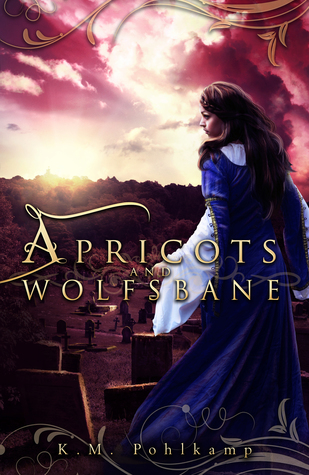 Lavinia Maud lies and murders, but she is also hopelessly in love, goes to church regularly, and gives shelter to a pair of orphaned siblings. In other words, the heroine of K.M. Pohlkamp’s Apricots and Wolfsbane may be a monster, but she is also adorable.
Lavinia Maud lies and murders, but she is also hopelessly in love, goes to church regularly, and gives shelter to a pair of orphaned siblings. In other words, the heroine of K.M. Pohlkamp’s Apricots and Wolfsbane may be a monster, but she is also adorable.
Herself orphaned at a young age, Lavinia turns her passion for gardening and scientific discovery, fueled by no small dose of “dark cravings,” into a reasonably profitable job as an assassin in 16th century England. Her method of dispatching “thieves, cheating husbands and dishonest bankers” are poisons she proudly and lovingly derives from a variety of plants, from castor beans to mushrooms to the meat of apricot seed.
For a while, the business of poison-making and murder for hire among the lower strata of Marfield’s society hums cheerfully along. But when opportunity presents itself to make a hit on a viscount, Lavinia cannot resist the prospect of “career advancement.” The job succeeds, but Lavinia is captured as she flees and is carted off to jail. From there she is rescued by another nobleman and becomes his family’s personal poison master, working to clear their way to titles and inheritance.
Lavinia serves her new patrons faithfully, and, based on her own code of ethics, never murders unless she is paid to do so, or at risk of being exposed. When she discovers the method of making a tasteless, odorless poison, she is offered membership in the secret Guild of Assassins that she has long coveted. But as Lavinia climbs the ladder of success amongst the unscrupulous and the greedy, she forgets that the greatest danger can lurk where we have put our love and trust.
Apricots and Wolfsbane is a darkly funny tale that sends an important message even as it winks at the reader along the way. Lavinia is alone in a world that is not friendly to women without a father or a husband. Her choice of profession may be eyebrow-raising, but her justification turns her into a sympathetic character. When asked by Marfield’s magistrate about her motivations, she replies: “My father handed you a profession, one I would gladly have taken if I could. What legacy did he leave me? What future do I have?” In a world of limited choices, a free spirit like Lavinia uses her intellect to pursue her own path with a guarantee of a steady income and control over her destiny.
As a writer whose own novel In the Warmth of the Sun centers on women’s (lack of) opportunities in historic times, this certainly rang true with me, murder and mayhem notwithstanding.
There is one final message in the story, and this one is more egalitarian. When Aselin, Lavinia’s apprentice, is asked whether she wants to participate in the assassination of a viscount, she says, “Nobility does not scare me (…) A viscount is a man, same as a thief. You know murder is all the same in the eyes of God.”
It is difficult to disagree with the fundamental truth of this statement. Replace “murder” with any other despicable act, and it still holds no matter who the victim – or the perpetrator – is.

I’m a fan of historical thrillers, and will certainly look into Apricots and Wolfsbane.It sounds like a fresh approach to the genre!
LikeLiked by 2 people
It’s definitely an original concept!
LikeLiked by 1 person
Interesting !! Thank you for posting
LikeLike
Sounds very good – I will read this book
LikeLike